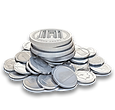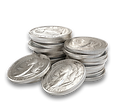The Allure of Platinum Coins: A Unique Investment Opportunity
- GoldsilverJapan

- Jul 12, 2025
- 3 min read
Updated: Jul 21, 2025
In this article, we’ll cover:
✅ The history of platinum coinage
✅ Platinum’s role in industry and technology
✅ Key differences between gold, silver, and platinum
✅ Why platinum coins may deserve a place in your portfolio
A Brief History of Platinum Coins
Platinum is a relatively recent addition to the world of coinage compared to gold and silver. The metal wasn’t widely recognized or refined until the 18th century.
Early Use of Platinum
18th century Colombia: Spanish colonists discovered platinum but initially viewed it as a nuisance mixed with gold.
19th century Russia: Russia began minting platinum coins (1828–1845) under Tsar Nicholas I. These coins were issued in denominations of 3, 6, and 12 rubles, marking them as some of the earliest known official platinum coinage in history.
The Modern Era of Platinum Coins
The first modern platinum bullion coin came from Canada in 1988 with the launch of the Platinum Maple Leaf. The American Platinum Eagle followed in 1997. Other mints, such as the Isle of Man, Australia (Koala), and Russia also joined the market.
Today, platinum coins primarily serve as bullion coins for investment, although they are occasionally released as proof coins for collectors.
Industrial Usage of Platinum: Beyond Bullion
One of the major distinctions between platinum and gold or silver is its widespread industrial use. Unlike gold, which is mainly monetary or ornamental, platinum plays a significant role in modern technology.
Key Industrial Uses of Platinum
🔹 Automotive Industry: It plays a crucial role in catalytic converters, reducing harmful emissions.
🔹 Medical Applications: Platinum is found in pacemakers, dental equipment, and anti-cancer drugs.
🔹 Electronics: Its high resistance to corrosion makes platinum ideal for connectors and sensors.
🔹 Hydrogen Economy: Platinum is vital in hydrogen fuel cell technology.
Due to these applications, platinum prices are partially driven by industrial demand, making its market behavior different from gold and silver, which are more sentiment-driven.
Platinum vs. Gold vs. Silver: Key Differences
Feature | Platinum | Gold | Silver |
Rarity | Rarer than gold | Highly sought after | Most abundant |
Main Use | Industrial + investment | Monetary + investment | Industrial + investment |
Volatility | Higher (industrial demand sensitive) | Lower (safe-haven asset) | Moderate to high |
Purity in coins | .9995 (standard for platinum coins) | .999 or .916 (22K) | .999 or .9999 |
Typical coin weight | 1 oz, 1/2 oz, 1/4 oz, 1/10 oz | Same | Same |
Investment Takeaway
Gold is the traditional hedge in crises.
Silver offers affordability and upside, but storage space and tarnish can be issues.
Platinum combines industrial strength with precious metal scarcity.
Notable Platinum Bullion Coins
Here are some of the most recognized platinum coins in the global market:
🇨🇦 Canadian Platinum Maple Leaf
First issued in 1988
.9995 fine platinum
Face value: CAD $50 (1 oz)
🇺🇸 American Platinum Eagle
Launched in 1997
Only U.S. coin with a different reverse design each year (proof version)
Face value: $100 (1 oz)
🇦🇺 Australian Platinum Koala
Produced by Perth Mint
Known for its annually changing koala design
High demand among Asian investors
🇷🇺 Russian Platinum Coins
19th-century ruble coins are highly collectible
Modern issues are also available for bullion investment
Why Platinum Coins Are Gaining Popularity
In recent years, platinum has gained attention due to:
✅ Rising industrial demand in clean energy (hydrogen economy)
✅ Undervaluation compared to gold historically (platinum was often priced higher than gold before 2010)
✅ Scarcity — annual platinum production is only about 5% of silver and 10% of gold
Combined with limited mintage and premium designs, platinum coins offer both collectible and strategic value.
Challenges of Investing in Platinum Coins
⚠️ Lower liquidity compared to gold/silver coins (fewer buyers)
⚠️ Higher premiums due to lower production volume
⚠️ Price volatility tied to the industrial cycle
⚠️ Storage — heavy and scratches more easily than gold
Still, for a well-diversified metals portfolio, holding even a small percentage in platinum can provide inflation protection with unique growth potential.
Final Thoughts on Platinum Coins
Platinum coins are often the hidden gems within precious metals. While gold and silver regularly attract attention, platinum coins blend beauty, rarity, and practical industrial value. They may not suit everyone, but for serious investors and collectors, platinum coins provide a compelling combination of scarcity and practicality.
Buy Platinum Coins at GoldSilverJapan
At GoldSilverJapan, we offer:
✅ Authentic platinum coins like the Maple Leaf, American Eagle, and Koala
✅ Transparent pricing based on live platinum spot price
✅ Buyback guarantee for liquidity
✅ Japanese and English support for collectors and investors
✅ Limited-edition and proof coins for advanced buyers
Explore Our Platinum Coin Collection Today
💬 GoldSilverJapan — Your trusted source for global bullion in Japan.










Comments